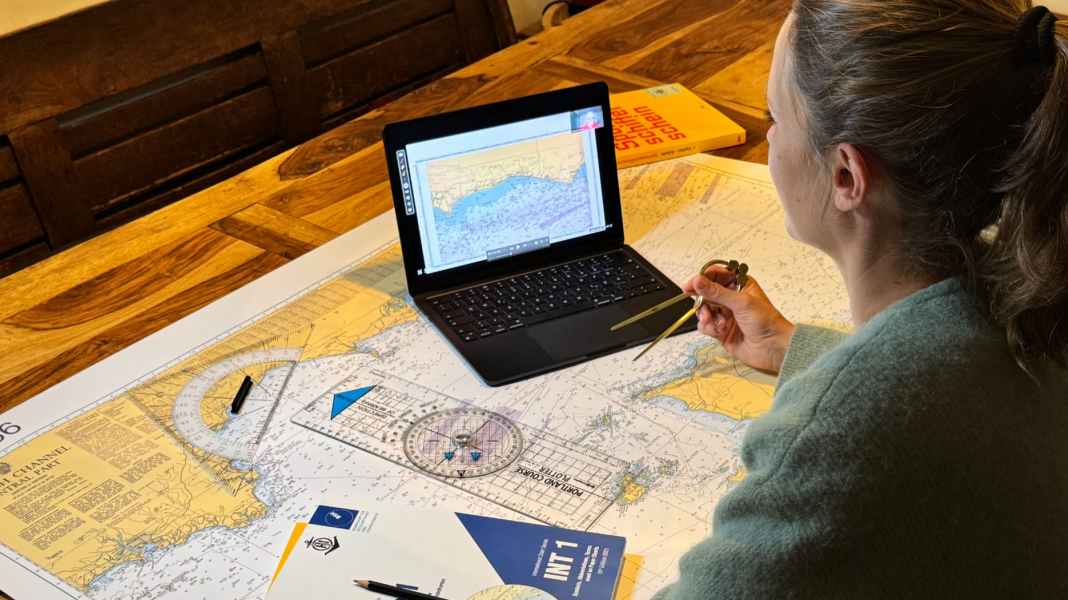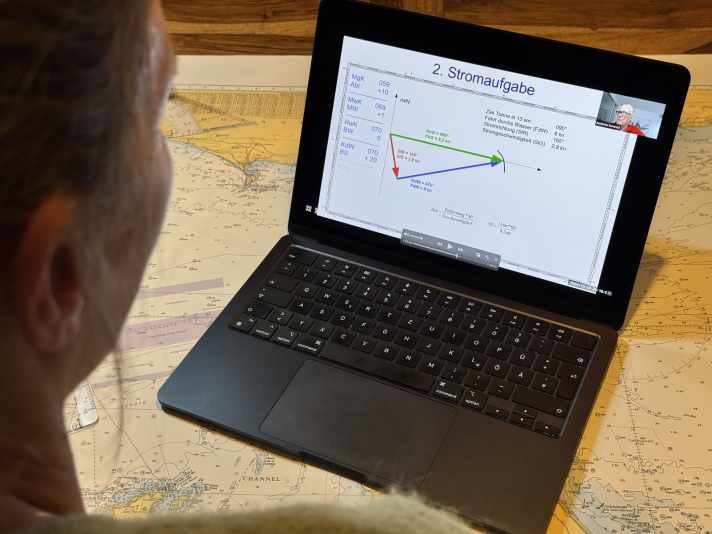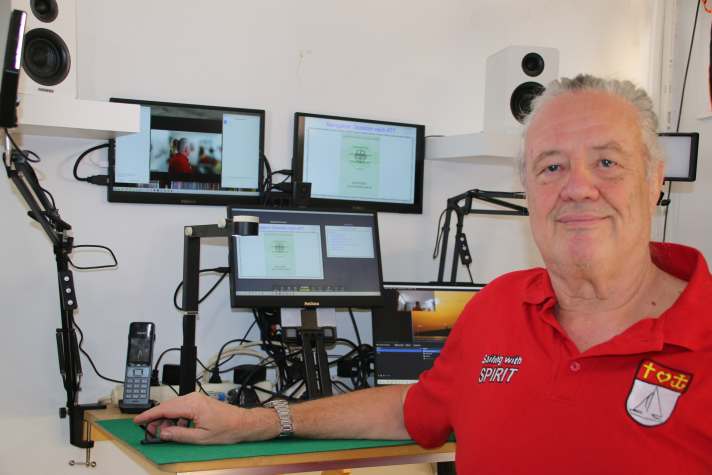
- Live stream not ideal
- Classroom on the Internet
- Radio discipline
- Time pressure for the recreational sailing licence
- Obsolete face-to-face teaching?
- A matter of taste
- Modular course structure
- Sports sailing licence: Theory online training courses (selection)
- Interview with Andreas Konrad from Sportbootschule.TV
- Requirements for the recreational sailing licence (SSS)
Anyone who holds a recreational sailing licence (SSS) in their hands after passing the exam can count themselves among an elite circle of ambitious recreational skippers and budding professionals. Passing the comprehensive theory exams alone under time pressure requires a lot of learning, perseverance and a high degree of discipline. To make matters worse, in contrast to the recreational boating certificates below, there are no longer any multiple-choice questionnaires or public questionnaires that can be practised or even memorised in advance. It is therefore important to have a basic understanding of the disciplines in order to pass. There are various ways to acquire the necessary knowledge. The classic way is still to attend a sailing school, where the required knowledge is taught bit by bit in a classroom course lasting several months. A seven-day compact course followed by an exam is also possible - and you're guaranteed to get your head spinning. When video conferencing became socially acceptable in the coronavirus era, many sailing schools also recognised the potential of "learning from home" and opted for online courses. The interest was enormous - there was a veritable run on the web-based offerings.
Live stream not ideal
IT specialist and sailing instructor Andreas Konrad had already started putting his courses online ten years before the lockdowns and had gathered experience of what works and what doesn't. He simply recorded his face-to-face lessons and made them available online. Back then, he simply recorded his face-to-face lessons and made the recordings available online. This is practical for those who have a long journey to the nearest sailing school, but the format has one major weakness: it is not possible to ask questions with direct feedback. Answers could only be provided at a later date, for example by e-mail. The online participant was therefore left out in a double sense and could at best hope that a "face-to-face participant" would ask a similar question and receive a mutually satisfactory answer. Not ideal for a course as learning-intensive as the SSS. Plus the feeling of not belonging to the group that deals with challenging topics such as tidal navigation or radar direction finding on site.
Classroom on the Internet
So Konrad switched his online courses to the webinar format. The course participants sit in front of the computer at the same time while the teacher gives a live lecture, hands out exercises and also discusses the answers. Questions can be asked in the same way as in face-to-face lessons. The subject matter is divided into four blocks - navigation, shipping law, meteorology and seamanship - over a total of 26 two-hour units from October to March. The aim is to combine all the advantages of face-to-face lessons with those of the online course. And if someone is unable to attend an appointment, there is always the recording. Is this the future of theory teaching? We tried it out and mingled with the webinar participants.
"A plotter doesn't make a bad navigator better. But it can significantly support a good navigator."
ANDREAS KONRAD, Sportbootschule.TV
Radio discipline
In the first double lesson, information is provided about the required radio discipline. Even though it is an interactive classroom, the video and microphone function must be deactivated at the start of the lesson. Although questions and feedback are expressly encouraged, they must first be indicated in the chat by "hand message". Interfering is an absolute no-go. Clear rules, but with around 40 registered participants there is no other way, otherwise it would quickly end in a Babylonian babble of voices. Disturbing background noises, such as screaming children, are faded out, as are embarrassing video sequences of half-naked people in the background. Lessons have been learnt from the early days of live online seminars. Fortunately, the obligatory introductory round, as we know it from seminars or meetings, has been omitted. Instead, a participant from the previous semester is invited to report on the exams they have successfully passed. An inspiring move, after all, all those present here also want to put on the "crown of yachting" in the form of a sports sailing licence in due course. The need to prepare individually for the exams was emphasised. Because only those who face the examiners "well lubricated" can deliver on time under stress and time pressure.
Time pressure for the recreational sailing licence
We start with the largest and most complex topic block, navigation. Right from the start, it is repeatedly emphasised that time is the biggest enemy during the exams. Hence the urgent appeal not only to work accurately, but also to generally include the degrees, bearings and times when making entries on the chart. It saves you having to re-measure and therefore time, nerves and, in case of doubt, even failing. Speaking of nerves. Anyone who has spent the whole working day sitting in front of a computer should at least go for a walk around the block and get some fresh oxygen before class starts. Two hours of focussed listening and collaboration will make your head glow more than you might think. The topics are well structured and are taught with all the time required for the learning group. The exercises set, on the other hand, are immediately driven forward with a little time pressure. After all, SSS skippers should also be able to function under pressure; not only in theory, but also in practice on board. The answers are initially given to the instructor in secret. The resolution takes place again in the circle of everyone and wrong answers are deliberately pilloried. However, this is not to embarrass anyone, but to increase the learning effect for everyone. If someone does not understand something or has simply forgotten it, there are recordings of the lessons afterwards, which registered participants can view again and again in the password-protected area of the website.

Obsolete face-to-face teaching?
"The triad of live sessions with the opportunity to ask questions at any time, the exercises and the lively exchange via the e-mail distribution list worked very well for me," confirms 22-year-old student teacher Victoria Regh. For her, the format of face-to-face teaching is outdated. "You save yourself and the environment the hassle of travelling and you don't have to lug around huge paper sea charts through the rain." However, working from home also requires space. Most desks reach their limits with nautical charts, computers, textbooks and chart cutlery. Then the dining table or even the floor has to be set up as a workstation and the family moved if necessary.
"As a woman, you are often patronised when sailing. Sometimes the SSS licence helps you to prove your skills."
PETRA AFFLERBACH, SSS skipper
A matter of taste
As in real life, the success of a webinar depends heavily on the speaker's ability to inspire the participants and keep them motivated. Personal preferences also play a role; if the instructor's voice and style have a soporific or even annoying effect on someone, it will be difficult to stay focussed over 25 double hours. Tip: Some providers offer recordings on their websites or on YouTube, which might be worth watching before making a binding booking. If not, it is highly recommended to ask for an "audio sample". Heino Kuhlemann, a medical computer scientist, says after passing his exams: "The only thing I didn't find so good about the online live format is that you sometimes have to listen to every question, even if it doesn't concern you. That can take a lot of time - even if that's absolutely right from a didactic point of view. I then simply cancelled and rewound later in the recordings until it became interesting for me again. Of course, that's not possible with face-to-face teaching; you can't just pop in and out." Kuhlemann also recommends using other sources for learning. The computer scientist has also bought several specialised books on meteorology. "Sailing and everything around it is my hobby, so I want to know everything about it and it helps to really understand complex issues."
More about driving licences and training
Modular course structure
A major advantage of the recorded block lessons is that the theory exams can also be divided up accordingly. This means that all four examination subjects can be taken together, individually or in any combination. If you are fit in one subject, you can take the exam and tick off that part. The only condition: All parts of the examination must be taken within a period of 24 months. The disadvantage of the partial examinations: higher costs due to the fees due in each case. Andreas Konrad offers his course participants a "success guarantee". If someone fails the exam or is forced to cancel the course for any reason, the course can be repeated as often as required free of charge. SHS students can also brush up on their outdated knowledge in the SSS courses. For Petra Afflerbach from Hamm, regular participation in the webinars has become such a habit that, despite having passed her exams long ago, she still regularly checks in to keep up to date with topics such as the British tide tables, which are not part of her everyday life on board. All participants in the SSS webinar agree on one thing: they would do it again in this format - and the Sport Offshore Skipper's Licence (SHS) is already casting its shadow ahead.
Sports sailing licence: Theory online training courses (selection)
Sportbootschule.TV (Andreas Konrad) Interactive webinar in 26 two-hour units. Can be repeated as often as required. Costs: 655 Euro www.sportbootschule.tv
Eichler Yacht School Presence and/or livestream. Alternating participation also possible.
Costs: 750 Euro www.yachtschule-eichler.de
Sailing Island Live online course with a maximum of 10 participants. Divided into two semesters, each with 2 sub-subjects. Costs: 850 euros www.sailingisland.de
German Ocean Sports Association HANSA e.V. (DHH) Various offers throughout Germany. Courses take place partly in person and partly online. Costs: from 550 euros www.dhh.de
Interview with Andreas Konrad from Sportbootschule.TV
"Learning via webinar saves time and money"
Andreas Konrad started moving his lessons online long before coronavirus. Today, it is impossible to imagine life without this format.

Mr Konrad, which certificates can you provide proof of?
I have all the licences that are available in Germany, including the three DSV coaching licences. However, I learnt to sail at a young age from my father, who was a professional skipper.
How long have you been offering training for the recreational sailing licence (SSS)?
I have been offering theory and practice courses for recreational boating licences for 20 years. Back in 2010, I started putting recordings of face-to-face courses online and linking them to live question and answer sessions. At the time, it was still quite cumbersome and clumsy because nobody had any experience with it. But the result was that ten years later we were well prepared.
You mean for the corona-related lockdowns?
Yes, exactly. All of a sudden there was a huge hype about online training and we were able to take off straight away. However, with the subtle difference that we switched from online courses to webinars.
Is that supposed to sound more modern or is there a serious difference between the two?
Session, similar to a classroom course, in which a lecturer interacts directly with the participants. Questions can be clarified immediately and tasks are discussed together. An online course consists of videos or live streams, where questions are often only asked afterwards by email and are not answered immediately. The lack of dynamism requires far greater discipline.
And what is the biggest advantage of a webinar over a classroom course?
The biggest advantage is the time and journey savings, especially with SSS, where the nearest school is usually not just around the corner. As the course takes place over several months, you also save money. Webinars also make it possible to participate from anywhere, whether on a business trip or from a holiday hotel. Participants can access recordings if necessary to catch up on missed content. In face-to-face courses, on the other hand, you miss out on content if you are absent and easily lose touch.
Are there any disadvantages?
One possible disadvantage is the lack of social contact, which some people miss. However, we have an e-mail distribution list where participants can exchange information. This year, I am also planning to introduce a kind of "open mic" after the lessons, where participants can stay online in the webinar environment and exchange ideas, similar to the informal get-together after a classroom course.
Aren't you worried that participants might fall asleep during the webinar?
Of course, I can't rule that out, even if I do my best to keep the students entertained along the way. However, I once had a student in a face-to-face class who was so exhausted from his work that he nodded off. Funnily enough, he was sitting right next to the light switch, so it suddenly went dark in the room. Such a faux pas, which is obvious to everyone, cannot happen in a webinar.
Requirements for the recreational sailing licence (SSS)
- - from 16 years
- - Possession SBF-See
- - Proof of 1,000 nautical miles after acquiring the SBF with the scope of maritime navigation as a watch leader or his representative (of which at least 500 nautical miles before the theoretical examination) or 700 nautical miles after acquiring the SKS on yachts in the sea area.

Morten Strauch
Editor News & Panorama

